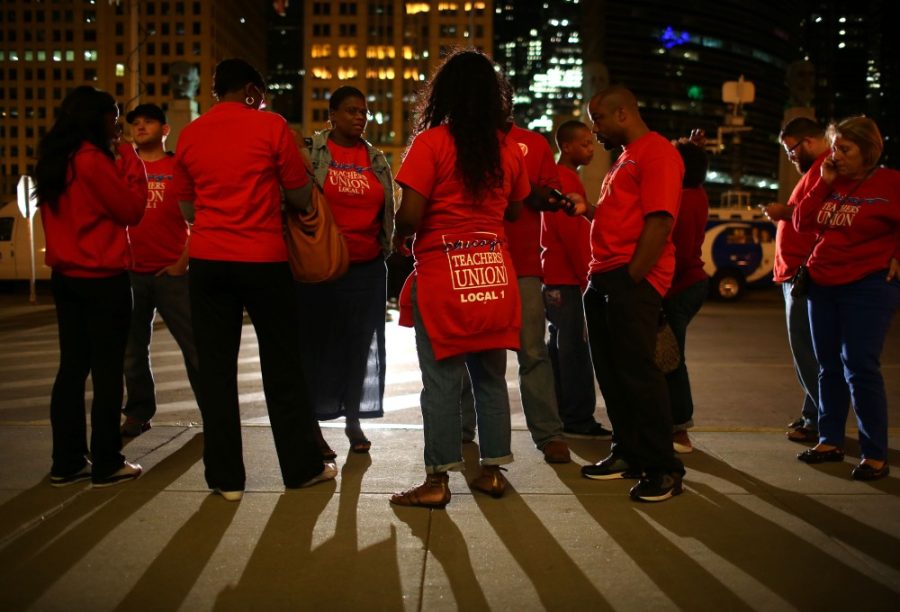CHICAGO — Mayor Rahm Emanuel sought to frame the Chicago Teachers Union strike Monday as one that could have been avoided.
As he did Sunday night after the union announced the walkout, Emanuel characterized the move as “a strike of choice. And it’s the wrong choice for our children.”
The mayor made his comments at Maranatha Church, one of the 59 faith-based organizations serving as a “Safe Haven” for students. While he praised faith leaders and parents for stepping in to fill the gap, Emanuel said “the safest place and the right place for children is in the classroom.”
The strike, the first in 25 years, already has made national headlines. Emanuel said he knows there may be some focus on the national implications of a teacher work stoppage, but he won’t let it distract his attention from the students and striking a deal.
“I’ve got enough challenges. I wasn’t looking for another challenge,” Emanuel said.
Emanuel once again argued that negotiations hinge on two remaining issues: a new teacher evaluation system and principals’ ability to get rid of teachers. Chicago Teachers Union officials said there are more remaining issues than that, although they conceded the strike is not primarily about money.
The strike on Emanuel’s watch cuts against the narrative the mayor is trying to craft as a leader who is a problem solver moving the city forward. Emanuel’s aggressive posture in pushing for a longer school day and year, while also cutting the pay raise teachers were supposed to get last year, galvanized the union.
With negotiations being watched carefully on a national basis, the soured relationship may have led union leadership to strike as a way to take a stand against Emanuel’s tactics. Sending Emanuel into negotiations to broker a last-minute deal wasn’t an option because there was so much bad blood between him and Chicago Teachers Union President Karen Lewis, several sources said.
Instead, the administration dispatched Board of Education President David Vitale to sit in on talks in the waning days. Vitale helped negotiate teacher contracts in 2003 and 2007, and the union took his hands-on involvement as a sign the district was serious about sealing a deal.
Meanwhile, only a handful of parents showed up at Eli Whitney Elementary School in the Little Village neighborhood to pick up their children Monday afternoon from a strike contingency program that appeared to be sparsely attended.
Maria Garcia, who lives across the street from the school, picked up her 11-year-old daughter Carla at 12:30 p.m. She said she and her husband are both unemployed.
During the strike, Garcia said, it’s good she can be with her daughter. “I understand both sides, they have their right to strike,” Garcia said in Spanish, “but it’s a shame my daughter can’t learn.”
Cynthia Gonzalez, a 19-year-old who just graduated from high school, picked up her niece and nephew after school. Their mother works full time.
Daniel Diaz de Leon, 8, said he was excited that he “got two hours on computers.”
“But I was freezing!” he said, because the air conditioning was on full blast.
Monica Diaz de Leon, 10, said her half-day at school was “fun,” but she still misses classes. “We don’t really learn anything,” Monica said. “What’s the point of going to school if you don’t get to learn?”
At the Disney Magnet school on Chicago’s North Side, eighth-grade teacher George Drase said 95 percent of the teachers were picketing. “We’re in the wrong spot. We shouldn’t be outside walking back and forth. We should be inside with the children.”
But the tremendous turnout among veteran and young teachers shows the level of solidarity, said Drase. “For those who have been here 20 years, not being in school is easier. But for the younger teachers, it’s a lot harder. They don’t know what to expect.”
To get some of the younger teachers involved, he said, he had to break down the numbers. “I sat down with them last year and crunched the numbers. I said what they were offering us, then, was like working on Saturday for free. They realized what that meant.”
While Disney, overlooking Lake Michigan, is one of the city’s better equipped schools, teachers said they are fighting for schools that don’t have as much.
“We have a lot more technology. We have an underground parking garage. We have air conditioning, but we’re doing this for every Chicago public school that doesn’t have it,” Drase said.









